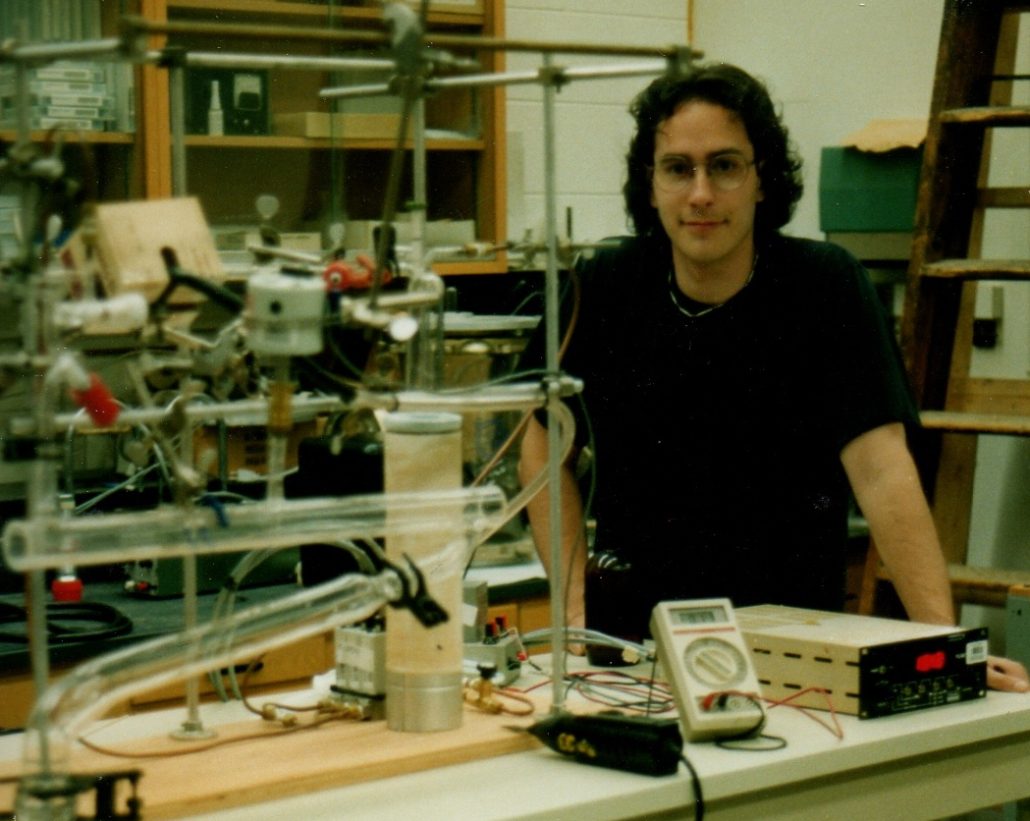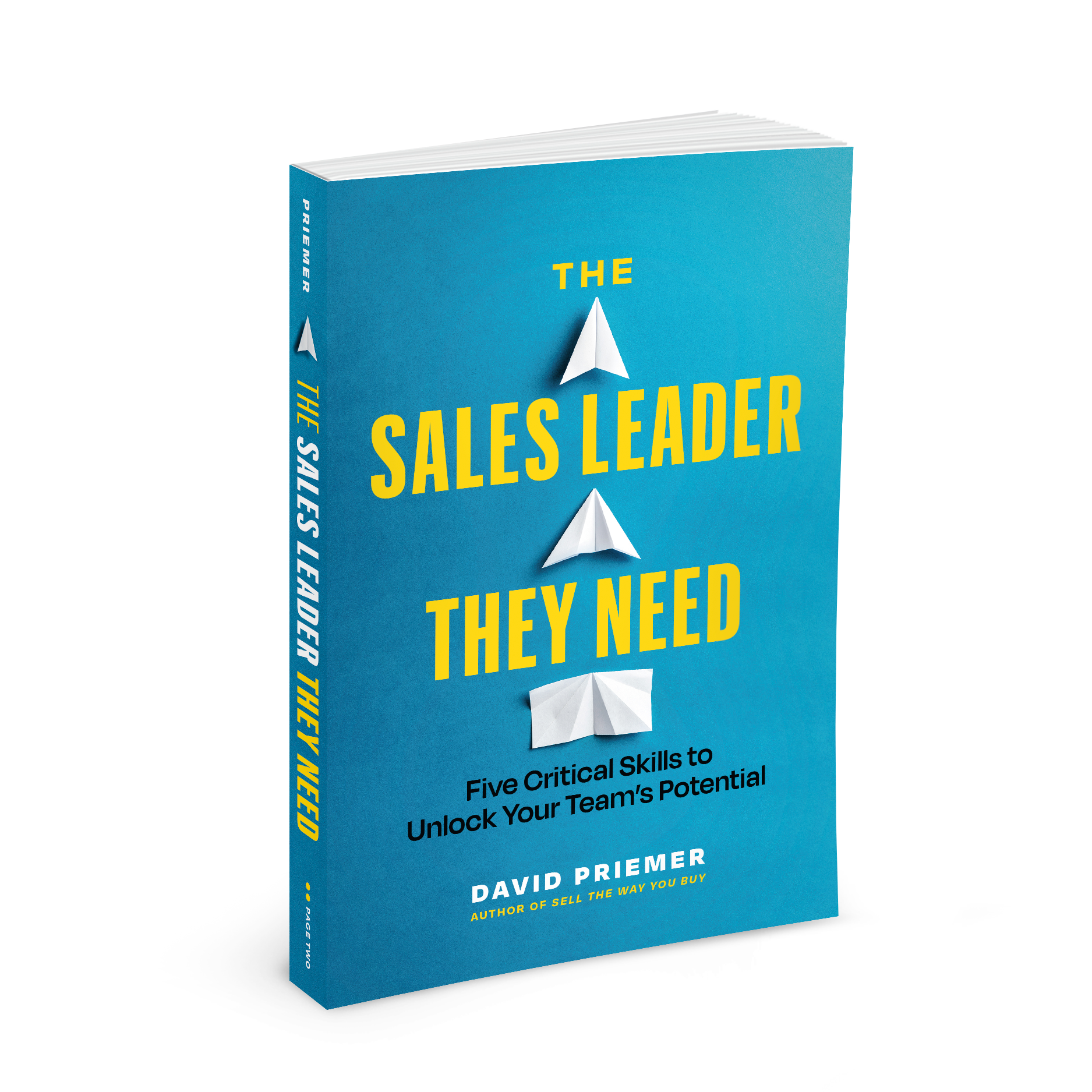6 Critical Sales Skills I Learned from Being a Research Scientist
In my wildest dreams, I never imagined I’d end up in sales.
You probably didn’t either.

David in his “Big Bang Theory” Days (1997)
I started my career as a research scientist and got into sales (by accident) in 2000 at the turn of the dot-com boom. Joining startups was the thing to do back then and I was lured into one by the promise of rocket ship growth and working with super smart people. Fortunately, we ended up growing that company to 700 employees and $100M over seven years before being acquired.
Since leaving my post as a research scientist, I’ve been a part of four great start-ups in sales leadership roles. One which I helped start in 2008 was acquired by Salesforce, which is how I came to work there. But I never forgot my scientific roots. In fact, I’ve come to realize that the skills I learned along that journey are absolutely critical to the success of any modern seller.
Here are my top six.
1. Explaining Complex Things Simply
It doesn’t matter how smart you are or how awesome your solution is if people can’t figure out what you do! Over my academic career, I sat through hundreds of lectures delivered by accomplished scientists describing the discoveries they made in their field. I didn’t understand a lot of it. That’s because the presenter assumed the audience was as familiar with their field of research as they were. That’s rarely the case. Your audience is no different.
As a salesperson, you might be intimately familiar with your products, services, and the problems you solve. But your customers often aren’t. And if you get into the weeds too quickly, you’ll instantly lose them!
If you want to keep your customer engaged, start by assuming they have no idea what you do.
Ask questions to gauge their level of familiarity with the subject matter. Frame the problem. And continue the conversation at the appropriate level from there.
To drive this point home, there’s a fun exercise I run in my client training sessions that you’re welcome to try. Think of a simple thing you take for granted in modern society that someone who lived 700 years ago would have no idea about. Something like traffic lights, solar power, or vaccines. Then consider how, in simple terms, you’d explain that thing to that person. Having seen many smart salespeople struggle to explain the concept of a traffic light, I bet you’ll find it’s not as easy as it sounds!
2. Taking Good Notes

The great Leonardo DaVinci called the city of Milan, Italy his home for 17 years. When I spoke at a sales conference there, I visited a museum that featured amazing models of his inventions recreated from the incredible sketches he meticulously documented in his notebooks.
Being a good scientist requires you to chronicle your research in painstaking detail. That way those who come after you can follow in your footsteps and build upon your work. Sales is no different. But in most cases, the person who benefits most from your note-taking is YOU!
Being able to summarize key takeaways after a discovery meeting, crafting a compelling business case, navigating a customer’s organization to find a champion, or reviving a dead opportunity months or years in the future, all require detailed notes. Writing things down is also a critical sales leadership skill when it comes to coaching and driving accountability across your team.
Whether you take them by hand, type them up as you go, or use a modern, AI-based note-taking app, in the world of modern selling, good notes are worth their weight in gold.
3. Having Conviction
In the worlds of science and business, there are tons of stories of researchers and entrepreneurs who needed to jump up and down and rage against conventional wisdom to get people to pay attention to their “wacky” ideas. Steve Jobs, Jeff Bezos, and Elon Musk are among them. Unfortunately, (as I’ve discussed at length in the past), one of the biggest challenges younger and newer sellers face when it comes to converting customers, is lack of conviction.
If you don’t have passion and belief in your solution, neither will your customer.
On the other hand, experienced, prescriptive sellers communicate with conviction. They provide clear, insightful recommendations and create intoxicating certainty around the buying process. They bring the future to their customers and make it easy for them to buy. If you’re looking to learn more about this critical concept along with 3 tips for manifesting conviction in your sales motion, check out this post.
4. Sweating the Details
As a chemical engineer, my research focused on developing a mathematical computer model of toxic contaminant movement in urban areas (and if you’re feeling super nerdy, you can check out papers one and two I published in academic journals after my research concluded). The model was complex, relying on hundreds of equations, variables, and input data points to replicate the physical systems at work in the real world. Having one of those elements off by even just a bit could significantly impact the validity of the results. Sales is no different.
On the surface, sales sounds easy. Connect with people. Identify a problem they have. They give you money to solve it. But if it was so easy, we’d be paying high-school students minimum wage to do it! Instead, professional salespeople are some of the most talented and highest-paid workers in our economy.
It’s no surprise that the best salespeople are also the most paranoid! They know the details matter.
Sales opportunities can be easily lost based on small things like:
- Not reaching out to an inbound lead quickly enough (i.e. Conversion rates are 8x greater in the first five minutes)
- Missing a key detail or pain during a discovery call
- Misunderstanding the nuance of how a customer’s decision will be made.
At the same time, they can also be won by:
- Being meticulous with your note-taking and follow-up
- Coming to customer meetings prepared and managing them properly
- Ensuring your solution aligns with your customer’s highest priority objectives.
Mastering sales requires you to play both the long and short games. Pay attention to the details!
5. Being Curious
In the hit classic movie, Back To The Future, scientist Doc Brown suggests that one of the reasons he built his time machine was to explore the origins of the universe and one day answer the age-old universal question, “Why?” Indeed, scientists are curious people and motivated by the thrill of learning and discovery. The same goes for the best salespeople.
Top sellers demonstrate genuine curiosity about their customer’s needs. They ask great questions and resist the temptation to start pitching their solutions as soon as they uncover a problem they can solve (I call this the “pain and pitch”, one of 3 Discovery Question Traps sellers fall into). Instead, they dig deeper! Not only does this help them serve their customers by better understanding their needs, but their acts of mindful exploration and listening promote trust and drive greater levels of buyer engagement.
6. Favoring Evidence over Hunches
Science doesn’t care what you believe. For example, you might believe, as many once did, that the Earth is flat. But that doesn’t make it so. Scientists may use hunches, intuition, and previous experience to guide their research, but they understand that hypotheses must be proven in order to claim them as discoveries. Unfortunately, the sales profession is often plagued by copious amounts of an opposing sentiment, confirmation bias.
Confirmation bias is the tendency to search for, interpret, favor, and recall information in a way that confirms one’s preexisting ideas or beliefs. It’s also known more colloquially in sales circles as “happy ears”. In sales, confirmation bias clouds your judgment, turns customers off, erodes the accuracy of your forecast, and prevents you from seeing sales opportunities with much-needed objectivity.
Like great scientists, the best salespeople practice healthy skepticism. They start their customer discussions assuming buyers likely don’t need, or aren’t willing to pay for, their solution, and look for evidence that they do.
When it comes to mastering the modern sales game, there’s a lot we can learn from how research scientists practice their craft. Basic strategies like taking good notes, being curious, and manifesting conviction in a simply-communicated value proposition can be a massive advantage in the battle for customer attention.
We promise never to send you junk or share your email! Just helpful sales insights.













